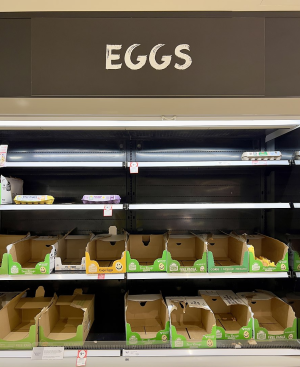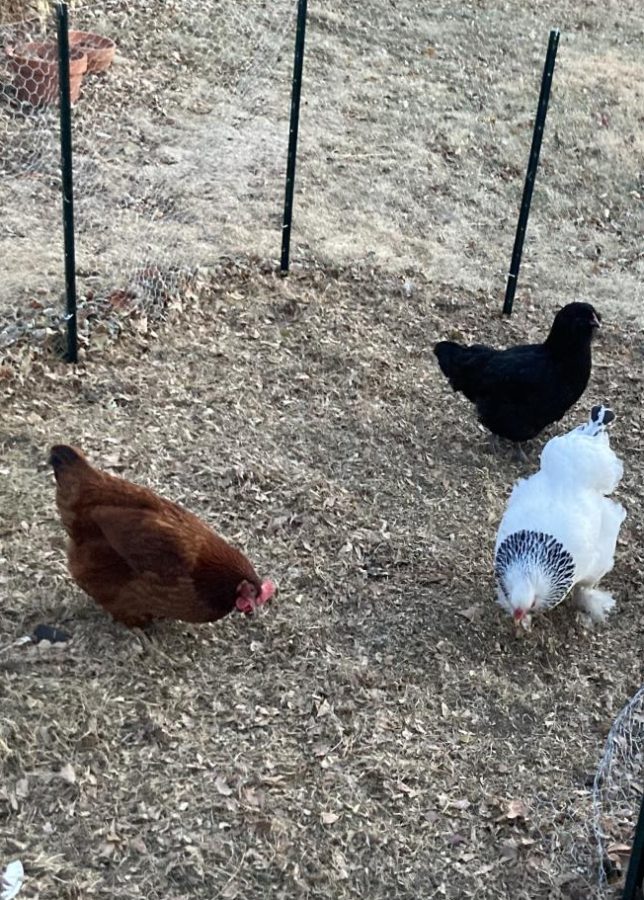Keeping Your Eggs Out of the Same Basket: The Thrills and Challenges of Chicken Ownership
A recent surge in prices for basic items, like eggs, has made raising food at home even more appealing.
For the practicing cook, the gradual development of expertise with the egg—from fried, to scrambled, to omelettes, soufflés, and more—is a rite of passage. However, a spate of news stories in the past couple of months have rung the tocsin that the cost of eggs has risen significantly, and in some places even the ability to access this basic food item is not a given. But for those who would prefer not to pay $18 for a dozen eggs, or have eggs smuggled in from Mexico, what other options exist for acquiring a product that traditionally has been inexpensive and readily accessible? In our continuing series of articles focused on food, we turn our attention this month to a story about homegrown food, and especially the ups and downs of keeping chickens.

Signs regarding the recent egg shortage are draped across almost every refrigeration case that contains eggs, letting consumers know their dozen eggs will no longer be around $4, but rather almost $8 a carton. These skyrocketing prices can be blamed on the recent avian influenza— bird flu—outbreak among chickens. In fact, this disease is so contagious, it has killed over 50 million birds since February 2022. To consumers who may be unaware of the current avian influenza outbreak, high prices are often blamed directly on the food retailers.
However, the avian flu outbreak is not the only attributable factor in accounting for the scarcity and rising prices of eggs. Just like the price of seemingly everything else has gone up in the past six months, so too has the cost of feeding, storing, and transporting both egg-laying birds and the eggs themselves, as reported recently in The New York Times.
The combination of these various factors have led to a challenging situation for many restaurants, home cooks, and cafeterias who rely upon easy and inexpensive access to eggs to prepare healthy meals for customers, families, and students. That’s why a growing number of homeowners, including several that we’ve interviewed here at Brownell Talbot, have decided to take matters into their own hands and raise their own chickens at home. With only a couple of exceptions, those we interviewed about chicken ownership spoke highly of the experience, in particular the ease of access to high-quality eggs, the sense of satisfaction with participating in the food-growing economy, and even the companionship provided by the birds themselves.

One notable member of the BT community who has recently become a proud owner of chickens at his home is Middle and Upper School Science teacher Mr. Sauer, whose interest in growing food also extends to the extensive work that he has done the past five years on the BT vegetable garden. Mr. Sauer shared with us some of his experience of taking an interest in raising his own chickens, as well as some of the research and work that had to go into preparing his home before they could be purchased. “Some people prefer to raise their hens from chicks, but it’s a lot more work. Someday it’d be fun to try it, but it’s a lot easier to start with mature chickens,” he observed.
Mr. Sauer also testified to the quality of the egg that is produced by home-grown chickens, which is notably of vast superiority to most of those that can be acquired at the supermarket, even when there is not a global egg shortage to contend with. BT juniors Lia Li and Jordan Hasse, who both have chickens at home as well, concur that their chicken’s eggs are some of the best they’ve ever had. Both Lia and Jordan noted that they give their chickens only organic food, and the result is a bright orange yolk when the egg is cracked, rather than the pale yellow that most cooks recognize from the large-batch supermarket eggs. No less an authority that eminent French-American Jacques Pépin ways in on this matter in his recently published book Art of the Chicken, as he notes that free range / organic chickens “lay exquisite eggs, with deep yellow-orange yolks high in lecithin, a healthy fat that is perfect for making a custard cream or a mayonnaise. The white albumen is high in protein, ideal for glossy meringues and glorious soufflés” (8).
Raising chickens at home of course is not for everyone, and all of those interviewed and consulted for this story make it clear that there are often times as many challenges are there are celebrations when it comes to caring for a living creature whose primary existence is to provide some food for the kitchen. The writer Susan Orlean, for example, recounts some of her own trials and tribulations with owning chickens, with whom she had forged a strong relationship, especially when she witnessed two of her chickens “picked off in broad daylight, probably by a hawk or an owl or a coyote or a raccoon or a fox—everyone in the woods loves chicken, and chickens, which don’t fly well, don’t run fast, and don’t fight hard, are sitting ducks” (“The It Bird” 30).
Much like maintaining a garden at home, or dedicating a part of your home to cultivate and harvest mushrooms, raising chickens is not a panacea that will end frantic trips to the supermarket, or free you from the caprices of food shortages or price hikes, but it can provide the same satisfaction of at least in part providing for your own needs. There’s also opportunity to learn about a topic that was likely unfamiliar before, such as the large varieties of chickens that one might acquire (for the record, Mr. Sauer is the proud owner of one Rhode Island Red, one Brahma, and one Americauna, who may one day lay blue eggs). Most of all, having the chickens around can be a daily reminder of the combination of so many things that have to go right—weather, health, transportation, economics—for us to have access to the great abundance of food that many people tend to take for granted. For more on that topic, tune in next month for a story about food insecurity, and the ways in which we can help those who do not have easy access to nutritious food on a daily basis.


























